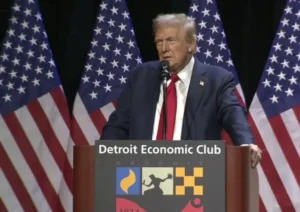The 2024 Election Race Heats: Trump and Harris Campaign Amid Hurricane Challenges
As the 2024 election approaches, Donald Trump and Kamala Harris intensify their campaigns in key battleground states, navigating challenges posed by recent hurricanes.
With less than a month until the pivotal 2024 presidential election, both former President Donald Trump and Vice President Kamala Harris are ramping up their campaigns. As they traverse key battleground states, recent hurricanes have added complexity to their messaging and public engagement strategies. This article delves into the latest developments from both candidates as they navigate these challenges.
Trump’s Campaign in Aurora, Colorado
 On October 10, 2024, Trump held a rally in Aurora, Colorado, where he focused on key issues that resonate with his base. His speech emphasized immigration reform and economic recovery, themes that have been central to his campaign since he announced his candidacy. During the rally, Trump criticized the Biden administration’s handling of immigration policies and vowed to restore what he described as “law and order” at the southern border.
On October 10, 2024, Trump held a rally in Aurora, Colorado, where he focused on key issues that resonate with his base. His speech emphasized immigration reform and economic recovery, themes that have been central to his campaign since he announced his candidacy. During the rally, Trump criticized the Biden administration’s handling of immigration policies and vowed to restore what he described as “law and order” at the southern border.
He stated, “We will not allow our communities to be overrun by illegal immigrants.” This message is particularly poignant in Colorado, where immigration has become a pressing concern for many voters. In addition to immigration, Trump addressed the economic challenges facing Americans.
He touted his previous administration’s economic performance before the pandemic and promised to bring back jobs and lower taxes if elected again. “We had the best economy in history,” he declared, urging voters to consider the implications of a Harris presidency on their financial futures.
Harris’s Response Amid Hurricane Fallout
In contrast, Vice President Harris is leveraging her campaign events to highlight her administration’s response to recent hurricanes impacting Florida and North Carolina. At a town hall meeting in Las Vegas, she emphasized the importance of federal assistance during natural disasters.
“This is not a time for politics; this is a time for action,” she stated, addressing concerns about the adequacy of disaster relief efforts. Harris also took the opportunity to criticize Trump‘s handling of emergency responses during his presidency. She argued that effective leadership requires compassion and readiness to support affected communities. “True leadership involves addressing challenges on behalf of the populace,” she asserted.
The hurricanes have not only disrupted campaign schedules but have also become a focal point for both candidates as they seek to demonstrate their capabilities in crisis management. Harris’s campaign has been actively engaging with communities affected by the storms, aiming to reassure voters of her commitment to disaster relief.
The Battle for Key Voter Demographics
 Both candidates are acutely aware that voter turnout among specific demographics will be crucial in determining the election outcome. For Harris, engaging with Latino voters is particularly vital. Recent polls indicate that her support among Hispanic voters has declined compared to Biden’s performance in 2020.
Both candidates are acutely aware that voter turnout among specific demographics will be crucial in determining the election outcome. For Harris, engaging with Latino voters is particularly vital. Recent polls indicate that her support among Hispanic voters has declined compared to Biden’s performance in 2020.
In Arizona, for instance, she holds a narrow lead over Trump among this demographic but faces challenges in maintaining enthusiasm. During her town hall, Harris addressed issues important to Latino voters, including healthcare access and small business support.
She emphasized her administration’s efforts to expand legal pathways for undocumented individuals while criticizing Trump for his past policies that she claims have harmed immigrant communities. On the other hand, Trump is focusing on white working-class voters who feel left behind by economic changes. His rhetoric often centres around restoring traditional values and ensuring job security through tougher immigration policies and deregulation.
Polling Dynamics
 As both candidates intensify their campaigns, polling data reflects a competitive race. According to recent surveys:
As both candidates intensify their campaigns, polling data reflects a competitive race. According to recent surveys:
- Harris leads Trump by approximately two points nationally, but key battleground states like Arizona and Georgia are showing tighter margins.
- In swing states critical for electoral success—Michigan, Pennsylvania, and Wisconsin—polls indicate that Harris maintains a slight edge but faces significant competition from Trump.
The fluctuating nature of these polls highlights how quickly voter sentiment can change as candidates adapt their messages based on current events.
The Role of Social Media and Misinformation
In this digital age, social media plays an increasingly influential role in shaping public perception during elections. Both campaigns are utilizing platforms like Twitter and Instagram to reach younger voters while also combating misinformation regarding their policies and responses to current events. Harris has been vocal about addressing misinformation related to federal disaster responses following Hurricane Helene.
She stated during her Las Vegas event that “spreading falsehoods about our efforts only harms those who need help.”Trump’s campaign has also faced scrutiny over claims made during rallies regarding hurricane relief efforts. His team argues that they are merely highlighting perceived inadequacies in the Biden administration’s response.
Conclusion: A Race Defined by Challenges
As we approach Election Day on November 5, 2024, both Donald Trump and Kamala Harris are navigating a complex landscape shaped by recent hurricanes and pressing voter concerns. Each candidate is attempting to position themselves as the leader best equipped to handle crises while addressing the needs of American families. With tight polling numbers and significant voter demographics at stake, every campaign event becomes crucial as they strive for voter engagement in an increasingly polarized environment.
The outcome of this election could hinge on how effectively each candidate addresses these challenges while resonating with voters’ needs and aspirations. For ongoing updates on the 2024 election race and insights into each candidate’s strategies, you can read more at C-SPAN and The Washington Post. As we continue to monitor developments leading up to Election Day, it remains clear that this race will be one for the history books—marked by its unique challenges and the resilience of American democracy.
